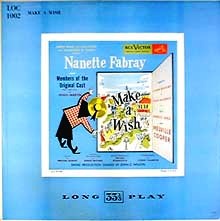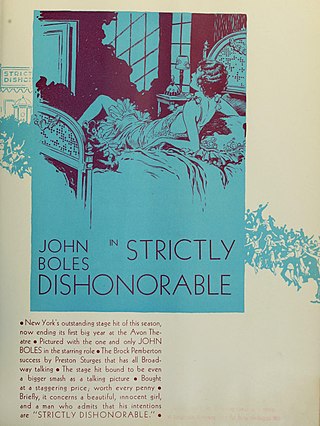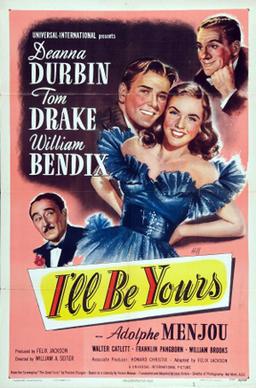Related Research Articles

Stage management is a broad field that is generally defined as the practice of organization and coordination of an event or theatrical production. Stage management may encompass a variety of activities including overseeing of the rehearsal process and coordinating communications among various production teams and personnel. Stage management requires a general understanding of all aspects of production and provides complete organization to ensure the process runs smoothly and efficiently.

Preston Sturges was an American playwright, screenwriter, and film director. Sturges took the screwball comedy format of the 1930s to another level, writing dialogue that, heard today, is often surprisingly naturalistic and mature, despite the farcical situations. It is not uncommon for a Sturges character to deliver an exquisitely turned phrase and take an elaborate pratfall within the same scene.

The Seagull is a play by Russian dramatist Anton Chekhov, written in 1895 and first produced in 1896. The Seagull is generally considered to be the first of his four major plays. It dramatizes the romantic and artistic conflicts between four characters: the famous middlebrow story writer Boris Trigorin, the ingenue Nina, the fading actress Irina Arkadina, and her son the symbolist playwright Konstantin Treplev.

The Real Thing is a play by Tom Stoppard that was first performed in 1982. The play focuses on the relationship between Henry and Annie, an actress and member of a group fighting to free Brodie, a Scottish soldier imprisoned for burning a memorial wreath during a protest.
David Harrower is a Scottish playwright who lives in Glasgow. Harrower has published over 10 original works, as well as numerous translations and adaptations.

Jed Harris was an Austrian-born American theatrical producer and director. His many successful Broadway productions in the 1920s and 1930s include Broadway (1926), Coquette (1927), The Royal Family (1927), The Front Page (1928), Uncle Vanya (1930), The Green Bay Tree (1933) and Our Town (1938). He later directed the original Broadway productions of The Heiress (1947) and The Crucible (1953).

Julius Tannen was a monologist in vaudeville. He was known to stage audiences for his witty improvisations and creative word games. He had a successful career as a character actor in films, appearing in over 50 films in his 25-year film career. He is probably best known to film audiences from the musical Singin' in the Rain, in which he appears as the man demonstrating a talking picture early in the film.

Port of Seven Seas is a 1938 American drama film starring Wallace Beery and featuring Frank Morgan and Maureen O'Sullivan. The movie was written by Preston Sturges based on the plays of Marcel Pagnol and the films based on them, and was directed by James Whale, the director of Frankenstein (1931) and The Invisible Man (1933). The cinematography is by Karl Freund, who filmed Fritz Lang's Metropolis (1927) and I Love Lucy (1951-1957).

Carnival in Flanders is a musical with a book by Preston Sturges, lyrics by Johnny Burke, and music by Jimmy Van Heusen.

Make a Wish is a musical with a book by Preston Sturges and Abe Burrows, who was not credited, and music and lyrics by Hugh Martin.

Strictly Dishonorable is a 1931 American pre-Code romantic comedy film directed by John M. Stahl and starring Paul Lukas, Sidney Fox and Lewis Stone, George Meeker, and Sidney Toler. It was written by Gladys Lehman and based on Preston Sturges' 1929 hit Broadway play of the same name. Strictly Dishonorable was Sturges' second play on Broadway, and his first to be filmed.

Strictly Dishonorable is a 1951 romantic comedy film written, produced and directed by Melvin Frank and Norman Panama, and starring Ezio Pinza and Janet Leigh. It is the second film to be based on Preston Sturges' 1929 hit Broadway play of the same name after a pre-Code film released by Universal Pictures in 1931 with the same title.
Strictly Dishonorable is a romantic comedy play written by Preston Sturges and first produced on Broadway in 1929. It was adapted for the screen twice, first in 1931, then again in 1951. The play was Sturges' second Broadway production, and the first of his plays to be made into a film. The Attic Theater Company revived the show at The Flea Theater in the summer of 2014.
Child of Manhattan is a 1932 play by Preston Sturges, his fifth to be produced on Broadway and his last for almost twenty years as his career took him to Hollywood. It was adapted into a film of the same name, released in 1933 by Columbia Pictures, the second play of Sturges' to make it to the silver screen, after 1929's Strictly Dishonorable.

Never Say Die is a 1939 American romantic comedy film starring Martha Raye and Bob Hope. Based on a play of the same title by William H. Post and William Collier Sr., which ran on Broadway for 151 performances in 1912, the film was directed by Elliott Nugent and written for the screen by Dan Hartman, Frank Butler and Preston Sturges. The supporting cast features Andy Devine, Alan Mowbray, Gale Sondergaard, Sig Ruman and Monty Woolley.

The Good Fairy is a 1935 romantic comedy film written by Preston Sturges, based on the 1930 play A jó tündér by Ferenc Molnár as translated and adapted by Jane Hinton, which was produced on Broadway in 1931. The film was directed by William Wyler and stars Margaret Sullavan, Herbert Marshall, Frank Morgan and Reginald Owen.
Recapture is a 1930 drama in three acts by Preston Sturges, his third play to appear on Broadway.

The Well of Romance is a 1930 musical comedy operetta in two acts with book and lyrics by Preston Sturges and music by H. Maurice Jacquet. It was Sturges' fourth production to appear on Broadway.

I'll Be Yours is a 1947 American musical comedy film directed by William A. Seiter and starring Deanna Durbin. Based on the play A jó tündér by Ferenc Molnár, the film is about a small-town girl who tells a fib to a wealthy businessman, which then creates complications. The play had earlier been adapted for the 1935 film The Good Fairy by Preston Sturges.
Sam Locke was an American writer and director who worked in theatre, television, and film.
References
Notes
- 1 2 3 Sturges, Preston; Sturges, Sandy (adapt. & ed.) (1991), Preston Sturges on Preston Sturges, Boston: Faber & Faber, ISBN 0-571-16425-0 , pp. 237-245